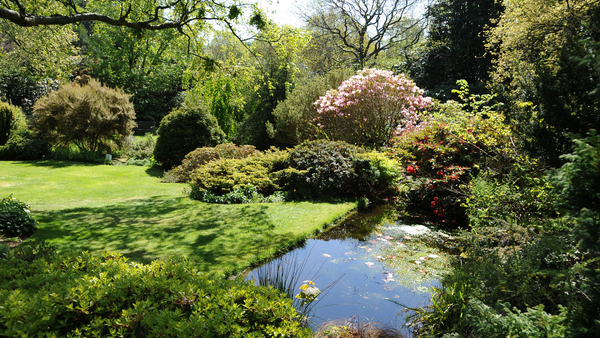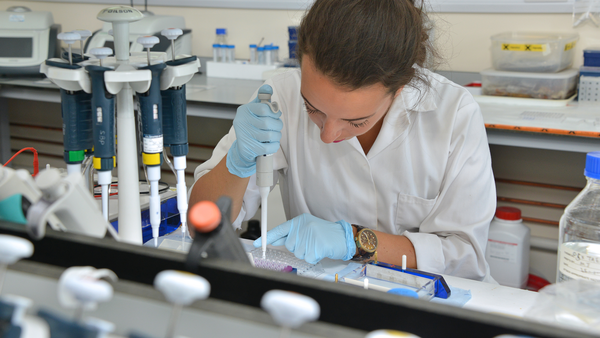Ama Abrafi Acheampong

This multidisciplinary MSc programme aims to train you to recognise and understand the threats and conflicts in the environment today and appreciate the steps required to develop solutions.
*NEO Energy are offering two postgraduate scholarships in a variety of taught degree programmes at the University of Aberdeen, including MSc Environmental Science. Each scholarship is valued at £20,000. Applicants must be classified by the University as Home or Rest of UK for tuition fee purposes. Find out more here.
The systematic approach of this MSc programme enables you to deal with all scales of the environment. Throughout your studies you will have various opportunities to participate in work outdoors and apply your theoretical and field work knowledge to real life situations. You will also gain experience using a range of tools for biological, chemical and physical measurement as well as models and data handling methods. Most importantly, at Aberdeen you will be part of a community that will help improve your knowledge and awareness of environmental science.
The MSc is aimed at graduates looking to specialise, enhance their skills & knowledge or retrain in environmental science and also academics and Government employees looking to further their career, develop industry contacts and remain at the forefront of environmental science.
Stage 1 compulsory courses include:
This course, which is prescribed for all taught postgraduate students, is studied entirely online, takes approximately 5-6 hours to complete and can be taken in one sitting, or spread across a number of weeks.
Topics include orientation overview, equality and diversity, health, safety and cyber security and how to make the most of your time at university in relation to careers and employability.
Successful completion of this course will be recorded on your Enhanced Transcript as ‘Achieved’.
Stage 2 compulsory courses include:
15 Credit Points
Lectures and structured workshops develop your knowledge of the principles and practice of geographic information systems, and familiarise you with ArcGIS software, enhancing your employability.
An individual investigation allows you to explore a specific application that you are interested in and demonstrate your proficiency with the software and your command of the conceptual underpinnings.
A flexible teaching and learning environment allows for individualised learning and enrichment for students with existing skills in GIS.
15 Credit Points
The mixture of applied science and theoretical work on this course places you in a valuable position for understanding the procedures and applications in modern environmental science.A number of laboratory classes allows you to familiarise yourself with the current analytical instrumentation in environmental science.The course uses examples of environmental issues allowing you to understand the problem, how the analysis was conducted and the implications of the results. The main assessment in this course is a practical write up that is written in the style of a scientific report giving you an opportunity to perfect this style of writing.
15 Credit Points
The course provides background information about the origins and development of Environmental Impact Assessment (EIA) process, and its implementation in the UK and elsewhere. It also highlights the significance of impacts associated with selected developments addressed in detail in seminars. The lectures and seminars are supported by workshop sessions focusing on case studies and providing insights into the issues that arise during the EIA. The course also provides an opportunity to develop transferrable skills valued by employers, such as team-working, time-management, communication of science, and critical appraisal. Throughout the course you will work with genuine EIA materials utilised during different stages of the EIA process, to identify likely environmental effects, judge their significance, and propose how they should be assessed and mitigated.
Plus one of the following courses:
15 Credit Points
This highly interactive course explores the principles and practice of contaminated land assessment and remediation. It provides broad knowledge of underlying science, as well as practical skills related to the assessment of contamination sources, pathways and risks to human health. While the lectures introduce theoretical background and gradually build the expertise, the practical have been based on various assessment tools and develop practical knowledge and quantitative skills. The learning activities replicate tasks that one would encounter in environmental consultancy and provide valuable transferrable skills.
A module underpinned by a research theme within the discipline of environmental science. This could be in a range of different areas of environmental science including; environmental monitoring, risk assessment, remediation, climate change, pollution mitigation, analytical development or modelling. It could be terrestrial, freshwater, marine or atmospheric in outlook.
Projects can be field, laboratory or desk based, or indeed a combination of these. Students may undertake this in Aberdeen or from an alternative national or international base.
60 Credit Points
The three-month individual Research Project can cover any area of environmental science and is undertaken under the supervision of a member of staff who is an expert in your chosen field. Many projects are also done in collaboration with an external organisation. The project provides opportunities for you to develop your abilities and skills, generate hypotheses and design ways of testing them and to analyse, report and discuss your findings. You will learn to take responsibility for implementing your own plans and modifying them as necessary. The project is written up in the style of a scientific paper manuscript or a consultancy report.
We will endeavour to make all course options available; however, these may be subject to timetabling and other constraints. Please see our InfoHub pages for further information.
| Fee category | Cost |
|---|---|
| EU / International students | £27,000 |
| Tuition Fees for 2024/25 Academic Year | |
| UK | £12,200 |
| Tuition Fees for 2024/25 Academic Year |
Further Information about tuition fees and the cost of living in Aberdeen
Visit our Funding Database to find out more and see our full range of scholarships, including our Aberdeen Alumni Discount.
Self-funded international students enrolling on postgraduate taught (PGT) programmes will receive one of our Aberdeen Global Scholarships, ranging from £3000 to £8,500, depending on your domicile country. Learn more about the Aberdeen Global Scholarships here.
To see our full range of scholarships, visit our Funding Database.
A wide range of teaching methods are used at Aberdeen to ensure that you are able to learn in a way that suits your learning style and enables you to achieve the best possible outcome. Our class sizes are small and we have a low student to tutor ratio, meaning you will have the full support of your group tutors.
Our great diversity in teaching methods is coupled by the use of latest digital technology to ensure course content is accessible to all students through a wide range of electronic formats.
The MSc also provides students with ample opportunity to learn outside the classroom so you can apply both theory and practice to real life situations. The majority of courses regularly extend activities and learning to outdoor field work, visits by industry experts and insights into real-life situations and problem-solving. The MSc programme includes extended field-based teaching at the start of your programme, at Ballater, Aberdeenshire. There are also several day-long field trips from Aberdeen throughout the academic year.
The dedicated research project you will undertake as part of your MSc provides training in study design, technical skills, recording results and observations and analysing results. Great flexibility is available in project selection; projects can be chosen from a list of developed by the students themselves in collaboration with supervisors. Projects can be field, lab and/or computer based and flexible to fit the student’s interests, aspirations and skill set.
The degree programme is assessed on the basis of performance in the research project and continuous assessment of coursework.
The information below is provided as a guide only and does not guarantee entry to the University of Aberdeen.
MSc
Minimum entry requirement for this programme is a degree in a biological, environmental or physical science, geography, or other relevant discipline at 2:1 (upper second class) UK Honours level, or an Honours degree from a non-UK institution which is judged by the University to be of equivalent worth. Candidates with at least a 2:1 or equivalent in other disciplines may be considered if they can demonstrate relevant experience and motivation.
Please enter your country to view country-specific entry requirements.
To study for a Postgraduate Taught degree at the University of Aberdeen it is essential that you can speak, understand, read, and write English fluently. The minimum requirements for this degree are as follows:
IELTS Academic:
OVERALL - 6.5 with: Listening - 5.5; Reading - 5.5; Speaking - 5.5; Writing - 6.0
TOEFL iBT:
OVERALL - 90 with: Listening - 17; Reading - 18; Speaking - 20; Writing - 21
PTE Academic:
OVERALL - 62 with: Listening - 59; Reading - 59; Speaking - 59; Writing - 59
Cambridge English B2 First, C1 Advanced, C2 Proficiency:
OVERALL - 176 with: Listening - 162; Reading - 162; Speaking - 162; Writing - 169
Read more about specific English Language requirements here.
You will be required to supply the following documentation with your application as proof you meet the entry requirements of this degree programme. If you have not yet completed your current programme of study, then you can still apply and you can provide your Degree Certificate at a later date.
Eligible self-funded post graduate taught (PGT) students will receive the Aberdeen Global Scholarship. Explore our Global Scholarships, including eligibility details, on our dedicated page.
Aberdeen Global ScholarshipsCompleting the MSc programme will give you the essential skills required to pursue a career in environmental science. You will be equipped with the knowledge, understanding and practical experience to take the necessary action in resolving environmental conflicts.
On graduating you will have several career options available to you, some of which include:
Many graduates pursue careers in the private sector to work for environmental and agricultural consultancies. Others move into Government associated work such as with the Scottish Government, the Department for Environment, Food and Rural Affairs (DEFRA), or regulatory bodies like the Scottish Environment Protection Agency (SEPA) and the Environment Agency (EA). A proportion of graduates use the skills learned to continue in research either at universities or institutes.
University of Aberdeen environmental scientists work closely with colleagues in research institutions all over the world and have active involvement with local, national and international governmental & non-governmental organisations including:
Both the MSc Environmental Science and MSc Environmental Management are IEMA approved programmes. This means graduates from these programmes automatically qualify for GradIEMA professional status – showing you are part of the next generation of leaders in sustainability. You can also fast-track an application to PIEMA (Practitioner Status) once you have gained enough experience to complete a work-based competence assessment. IEMA Student Membership is also free on approved programmes, underpinning your studies with an invaluable toolkit of resources.
The programme will be delivered by a multidisciplinary team of world renowned and vastly experienced researchers in environmental science with each course having its own specialised co-ordinator(s).
You will be taught by a range of experts including professors, lecturers, teaching fellows and postgraduate tutors. Staff changes will occur from time to time; please see our InfoHub pages for further information.

The Cruickshank Botanic Garden is situated on our King's College campus. It is used to support both our teaching and research; existing to promote the diversity and importance of plants and their role in the natural world.

The University’s award winning Sir Duncan Rice Library is listed in the “Top 20 spellbinding University libraries in the World”. It contains over a million volumes, more than 300,000 e-books and 21,000 journals.
Find out more
Our laboratory facilities include advanced analytical equipment to study soil chemical, physical and biological properties. Students have the opportunity to access state-of-the-art facilities such as mass spectroscopy, GC-MS and XRay CT imaging.